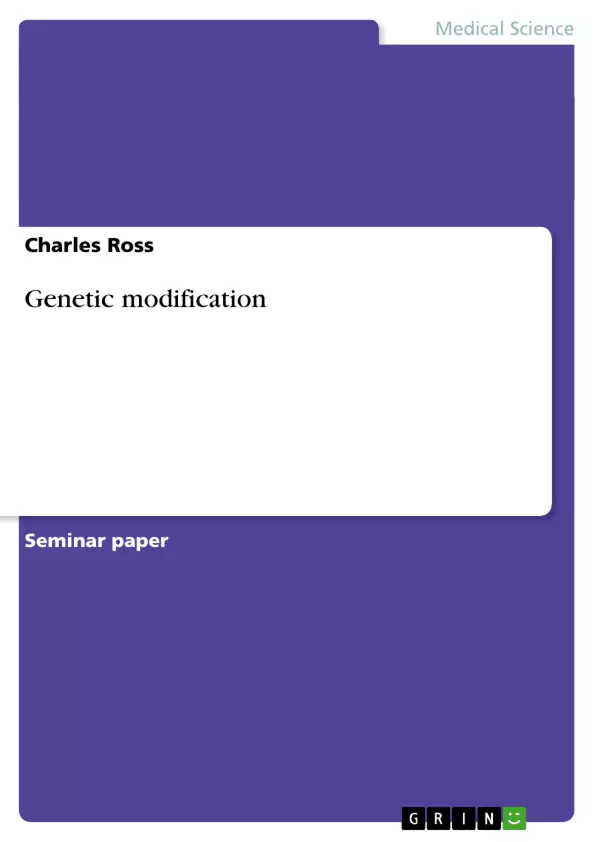Genetic modification is a biotechnology that is used to make new products, in particular new types of crops or organisms < http://www.defra.gov.uk/environment/quality/gm/>;. It involves the use of biotechnology techniques to change or alter the genetic make-up of an organism such a plant or animal. All organisms have a make up that is relatively similar, in that each and every organism has its characteristic marked up in the nucleus of its cells in a cellular component known as DNA. In each and every cell, among the billions of cells that make up an organism, contains a cell nucleus that holds this important genetic material known as DNA. The DNA contained in each cell contains mapped out information that controls the functioning of the organism, in addition to carrying the inheritable characteristics that are passed down from one generation of the organism to the next. DNA (deoxyribonucleic acid) is what carries the unique genetic characteristics that conform to each individual. It is these genes that contain instructions to make the building blocks of life in organisms- proteins, starch, oil, fibre or fat that is used within the organism < http://www.csiro.au/Outcomes/Food-and-Agriculture/WhatIsGM.aspx
Inhaltsverzeichnis (Table of Contents)
- Genetic Modification
- Transgenic Technology
- Ethical Concerns
- Transgenic Organisms
- Health Risks
- Cloning
- Personal Views
Zielsetzung und Themenschwerpunkte (Objectives and Key Themes)
This text explores the ethical considerations surrounding genetic modification, focusing on the implications of transgenic technology and its potential impact on human society.- The use of genetic modification to improve crops and organisms.
- The ethical implications of transgenic technology, particularly the creation of chimeras.
- Concerns about the potential for unintended consequences of genetic modification, including the development of new diseases and the creation of a "slave race" of humans.
- The importance of regulating genetic modification to ensure its safe and ethical use.
- The author's own perspective on the ethical considerations surrounding genetic modification.
Zusammenfassung der Kapitel (Chapter Summaries)
- Genetic Modification: This chapter introduces the concept of genetic modification and its potential benefits, such as disease-resistant crops and the development of new medicines. It also discusses the ethical concerns surrounding genetic modification, particularly in relation to transgenic technology.
- Transgenic Technology: This chapter examines the ethical concerns surrounding the creation of transgenic organisms, such as the blurring of species boundaries and the potential for unintended consequences. The chapter also discusses the use of transgenic mice to study human diseases and develop new treatments.
- Ethical Concerns: This chapter explores a variety of ethical concerns related to genetic modification, including the potential for the development of new diseases, the creation of a "slave race" of humans, and the control of this technology. It also raises questions about the definition of "human" in the context of genetic modification.
Schlüsselwörter (Keywords)
The text focuses on genetic modification, transgenic technology, ethical considerations, chimeras, human dignity, and the potential risks and benefits of genetic engineering. It examines the ethical implications of manipulating the genetic makeup of organisms and the need for careful regulation of this technology.Frequently Asked Questions
What is genetic modification?
Genetic modification is a biotechnology used to alter the genetic make-up of an organism, such as a plant or animal, by manipulating its DNA to create new products or traits.
What is transgenic technology?
Transgenic technology involves transferring genes from one species to another to create organisms with specific desired characteristics, such as disease-resistant crops.
What are the ethical concerns regarding chimeras?
The creation of chimeras (organisms containing cells from different species) raises significant ethical questions regarding the definition of species boundaries and human dignity.
Can genetic modification lead to new diseases?
There are concerns that unintended consequences of genetic engineering could potentially lead to the development of new pathogens or unforeseen health risks.
Why is regulation important in biotechnology?
Strict regulation is necessary to ensure that genetic modification is used safely and ethically, preventing potential abuses like the creation of a "slave race" or environmental damage.
- Quote paper
- Charles Ross (Author), 2010, Genetic modification, Munich, GRIN Verlag, https://www.hausarbeiten.de/document/269788


